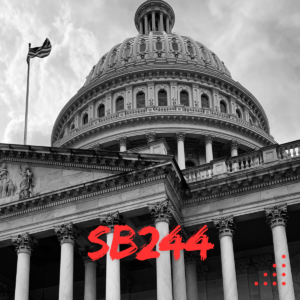You may have heard rumblings that the South Carolina tort reform bill (SB 244) is “dead.” That’s not technically true, though the bill would (thankfully) have a difficult uphill battle to passage before the legislature adjourns in May.
Status of the SC Senate Tort Reform Bill
In late March, the South Carolina Senate passed significant amendments to SB 244. Some of those amendments make the bill somewhat less bad than the original, but–like most tort reform propositions–it still isn’t good for South Carolina residents and small businesses. That’s because tort reform is designed to help insurance companies, not injured people, homeowners or business owners.
The amendments include:
Changes in the Procedure for Adding Non-Parties to the Verdict Form
The amendment to the bill made some procedural changes and added a list of people and entities who could not be added. While the timeline changes give the plaintiff more notice and opportunity to object and the excluded entities solve some narrow issues, the proposed change in the law is still bad for South Carolina residents and businesses.
Allowing the insurance company to point the finger at non-parties creates a substantial risk that a seriously injured person won’t receive full compensation. And, putting the non-party on the verdict form means a local homeowner or business who hasn’t even been sued can be adjudicated negligent–a black mark on the public record and one that may in turn raise their insurance rates.
A Change in Uninsured Motorist Coverage Requirements
The original bill would have allowed insurance carriers to exclude punitive damages from their uninsured motorist coverage. The amended provision would require insurance carriers to offer uninsured motorist coverage for punitive/exemplary damages, but would allow the insured to accept or reject that coverage.
While making it mandatory to offer the coverage is an improvement over the original bill, the new provision means insureds would have to choose to pay more to keep the same level of coverage they already have.
Changes to the Limits on Noneconomic Damages in Medical Malpractice Cases
Under current law, noneconomic damages are capped in medical malpractice cases unless the provider is found to have been grossly negligent, acted wilfully, wantonly or recklessly, or committed fraud or misrepresentation with regard to the claim.
The original bill would have wiped out most of those exceptions. The amended bill restores exceptions for wilful, wanton and reckless conduct. But, medical providers who are found grossly negligent are still protected by the cap, as are those who engage in fraud or misrepresentation.
The changes also came with a trade-off. Currently, there’s no cap when the provider’s actions fall into one of the excepted categories. The amended bill would create a new, higher cap for those cases. That means liability of a medical professional would be limited even when they seriously injure someone by acting willfully or recklessly.
The Statute of Repose for Construction Defects is Increased from 8 Years to 10
This change masquerades as a compromise, but is actually even worse for homeowners and commercial property owners than the original bill.
Under current law, no claim for construction defects may be brought more than 8 years after completion of the work, unless one of a list of exceptions applies. Those exceptions are intended to ensure that a bad actor whose negligent or intentional errors and code violations aren’t off the hook simply because the property owner didn’t know about them.
The original bill restricted that list, making it more likely that a property owner would be responsible for expensive–even crippling–repairs if they didn’t find out about the builder’s sloppy or intentional cut corners in time.
The amendment pretends to offer greater protection to property owners by extending the time from 8 years to 10. But, all exceptions are eliminated. That means a homeowner or commercial property owner would always be responsible for a contractor’s negligence or building code violations if they were not discovered quickly enough
Who Benefits from the Changes?
The technical details of the law changes may be a bit overwhelming, but the underlying issue is simple: who benefits if this bill passes?
- If nonparties are on the verdict form, insurance companies stand to save a lot of money. Injured people stand to lose out on compensation they need to pay medical bills and rebuild. Local business owners stand to have their reputations harmed without an opportunity to defend themselves.
- If covering punitive damages under uninsured motorist policies isn’t required, insurance companies stand to save big money on payouts. Injured people will either lose out on damages they are entitled to or have to pay higher premiums.
- If noneconomic damages in medical malpractice cases are capped even if the doctor or facility has done something horribly wrong, insurance companies save money. People injured by those doctors lose out on compensation and bad doctors continue to practice medicine.
- If construction companies are off the hook after 10 years no matter what they did wrong, insurance companies save a lot of money. Homeowners and commercial property owners are left with buildings that may be expensive to repair, or even impossible to fix, and no recourse.
You may have noticed that the key result of each and every listed change is “insurance companies save money.” And insurance companies are lobbying hard for this bill. But the impact on South Carolina residents and businesses is much darker.
What Happens Next with SB 244?
The Senate passed the amended bill and sent it to the House for consideration. To become law, the bill must be read three times in the House, with an opportunity for debate and submission of amendments. If the House opts to amend the bill, the amended version would then be sent back to the Senate for consideration of the new version.
On April 3, the bill was introduced and was read in the House for the first time. The bill was referred to the House Judiciary Committee.
Unless the House embraces the bill and votes to pass it with little debate and no amendments, it is unlikely that the process could be completed before the legislature adjourns in May. However, advocates for the bill continue to lobby behind the scenes, so please take a moment to let your Representative know that you don’t want the legislature to help insurance companies at the expense of your friends and neighbors.
Find your local representatives here.
South Carolina Elected Representative Search



